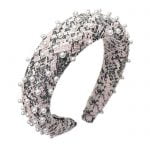A look from Redress Design Award 2018 winner Tess Whitfort’s collection. Image credit: Sam Tso
In Hong Kong last week, 11 finalists competed for the Redress Design Award showing their sustainable collections on the runway. The winner was Tess Whitfort, a 24-year-old from Melbourne who graduated last year with a bachelor degree in fashion design from Box Hill Institute. There were just five people in her class. The course has a strong focus on sustainability, she explains. “We were taught to think differently.”
Traditionally, the designer’s role has been to create a beautiful garment or collection, perhaps taking it one step further to imagine a customer wearing it. Then. Nothing. It is not yet the norm for designers to consider what happens to a garment after its first owner tires of it. To plan for future lives. Can the fabric be recycled? If not, will it biodegrade? What about the trims, the threads?
Yet up to 80 per cent of a product’s environmental impact is decided at the design stage. Designers have enormous power to look beyond aesthetics in order to green fashion. That’s vital in the context of the industry’s current waste crisis. According to the Ellen MacArthur Foundation, out of the 53 million tonnes of material used for clothing production every year, 87 per cent is landfilled or incinerated after its final use.
Of course, aesthetics matter. If it’s not beautiful, desirable, cool, covetable—well, there’s no point is there? Whitfort, for her part, steers towards cool. She accepted her award wearing barbed wire hoop earrings and a hand-painted yellow and black T-shirt worthy of Johnny Rotten.
“I’m inspired by punk and counterculture,” she says. “I want to capture that rebelliousness in my work. Being a sustainable designer means being a bit of a rebel and not being afraid to break the mould and try new things. Aesthetically, I take elements of grungy, rebellious style and mix them with a bit of elegance and refinement.”
It was her holistic approach that appealed to judges—including me. I joined upcycling legend and Fashion Revolution co-founder Orsola de Castro; designer Johanna Ho; Roger Lee, CEO of TAL Group and The R Collective’s Denise Ho on the panel.
We all loved how Whitfort forensically examined every element of her collection through the sustainability lens. She used deadstock linen, eco-friendly screen print inks, and upcycled metal hardware. But it was her highly complex zero waste patterns that clinched it.
The second prize was claimed by Jesse Lee, a man who can do incredible things with old umbrellas, and who will be mentored by de Castro.
The Redress Award is now in its seventh year. It was launched in 2011 (as the EcoChic Design Award) by Christina Dean, the Hong Kong-based Brit behind Redress, an environmental charity that works to cut waste out of fashion. In 2017 Dean founded a sustainable, social enterprise fashion brand called The R Collective, with which Whitfort, as part of her prize, will now collaborate.
Alumni include London crochet queen Katie Jones and Kevin Germanier, a Swiss designer and Central Saint Martins grad whose crystal-strewn pieces have been worn by Bjork.
In the early years, the competition was focused on Asia. But the 2018 finalists came from Hong Kong, India, Taiwan, Japan, the Philippines, Israel, Denmark, France, Spain, the UK and Australia.
“The talent we are seeing coming through is enormous and growing every cycle,” says Dean. “These emerging designers are the future of the fashion industry and they are ready and willing to take on the challenges that are here today.”
[“Source-vogue”]












